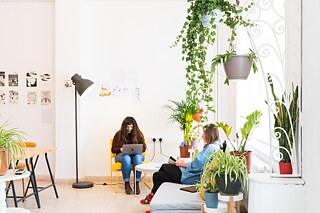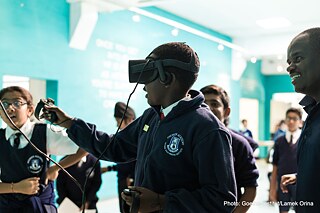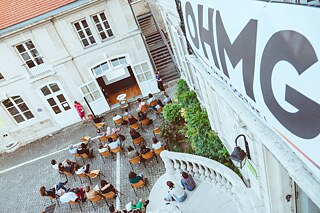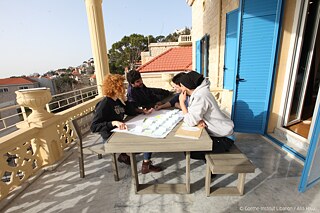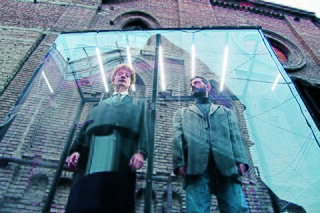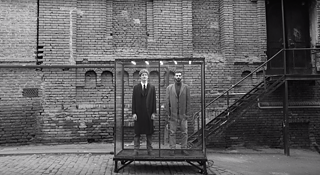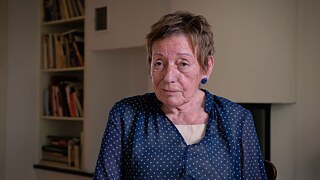The Goethe-Institut
In Society
Art requires space, security, freedom, and support. In over 150 countries, the Goethe-Institut is working to ensure that local cultural scenes can flourish as freely as possible. It helps build sustainable structures for the arts and creative economy and creates safe spaces for creative professionals – even in places where artistic freedom and freedom of expression are under threat.
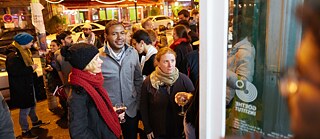
“The cultural and creative sector is an engine for shaping social change in the world,” Cultural and Creative Industries Officer at the Goethe-Institut’s Munich headquarters Nico Degenkolb explains. “We see it as our mission to promote this sector in different countries – and feel it is very important to tailor our efforts to the respective local needs.” The Goethe-Institut’s programmes in the arts and creative industries reach people in countries such as Jordan and Kenya, France and South Africa.
Gathering speed with HUB@Goethe
The HUB@Goethe programme, which supports artists in South Africa, is one example: “I am dynamic, and I am a dreamer,” is how Sechaba Lengane describes himself. The South African is pursuing his very own dream of bringing people together with equal determination and energy. His “The Coal” film project comprises ten to fifteen-minute video sequences showing two people from different generations sharing a meal and talking with the help of question cards: mothers and daughters, grandparents and grandchildren, fathers and sons. In them, Lengane explores the role of meals, the often “healing effects” of eating together – and of conversation that transcends generational boundaries as well.Lengane is one of 13 artists and young entrepreneurs from the greater Johannesburg area taking part in the Goethe-Institut’s mentoring program in 2021 – the greatest number since it was launched in 2017. Nicknamed the “hubbers,” they go through several stages, guided step by step through developing their company or art project over a period of seven months. The programme also offers practical support, and hubbers meet, exchange ideas and use the internet connection and printer in the “Library Gamebox Hub”, the newly designed library in Johannesburg.
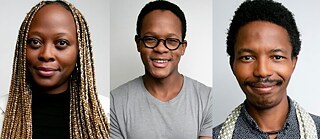
f.l.t.r. Godisamang Khunou, Sechaba Lengane, Thami Mazibuko | Photo: Thabang Radebe
This is also where Godisamang Khunou looks forward to working in future. The director runs a production company for documentaries and feature films and focuses primarily on feminism in Africa. Her most recent film won an award at the 2019 DOK Leipzig and was also named Most Promising Film by the Durban Film Mart. She aims to support women in her country by hiring them as photographers and editors. She says she has already learned a lot in the first Hub mentoring events, about business topics but also about herself and her own strengths. So far though, it has all been in theory. “Now I want to see it all come to life with the programme’s help,” she says.
Thami Mazibuko also wants to bring life into his community: His vision is to keep the Soweto Book Café he runs in the Johannesburg township of the same name developing into a cultural meeting place. Mazibuko, who describes himself as an arts and culture activist, already organises literary events and chess evenings at his café on a regular basis. “I want people to be able to exchange information and pick up on lifestyle trends here,” he says. As a “Goethe hubber,” he wants to acquire entrepreneurial skills so that his business can grow, turn a profit, and stand the test of time.
“The Coal” entrepreneur Sechaba Lengane is taking advantage of another aspect of HUB@Goethe: the international network the programme offers access to. He says, “I’ve always been fascinated by the Goethe-Institut as an institution that supports the arts and creative industries – on our continent, but also globally.” He is interested in learning from others, and growing, so he can realise his dreams.
In the summer of 2020, the Goethe-Institut and the German Foreign Office initiated the International Relief Fund established to help foreign cultural and educational organisations mitigate the impact of the coronavirus pandemic.
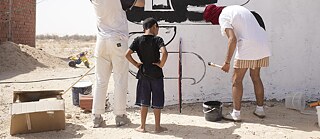
To ensure that the developments triggered by the Arab Spring around ten years ago continue, the Goethe-Institut has implemented more than 150 projects with more than 30,000 participants in the region as part of the Ta’ziz partnership since 2012. These include “Houmtek,” where neighbourhood initiatives from across Tunisia beautify and claim public spaces. “Our project contributes to improving living conditions for residents in Cité Erriadh, a working-class neighbourhood in Beni Khiar with 3,000 residents,” says a delighted Samira Ben Ammar, who transforms illegal garbage dumps into urban gardens with the involvement of children and young people from the local community.
Creating spaces for exchange: artists in safe exile
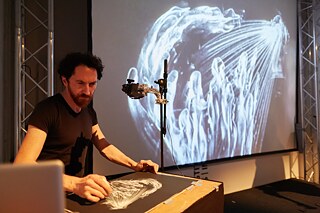
To give Syrian artists a point of contact in exile – but also to send a powerful signal – the Goethe-Institut Berlin created a new space for cultural encounters: the “Goethe-Institut Damascus | In Exile,” a temporary pop-up space in a vacant storefront in Berlin-Mitte. In autumn 2016, discussions, workshops, film series, exhibitions, and concerts took place here, and Syrian artists and authors were given a stage to explore the effects of war and displacement on their work. Here, protected, heard and in front of an audience, they found the words to discuss central aesthetic and ethical questions, such as how to portray the Syrian revolution, the violence it unleashed, without turning it into a spectacle or a projection space for pity.
Support in and for the art and creative scene in crisis countries is likely to continue: In the summer of 2021, the German Embassy in Minsk received a request from the Belarusian Ministry of Foreign Affairs to cease the activities of the Goethe-Institut in its country as of July 30, 2021. This had never happened before in the Institute’s 70-year history. For 27 years, the Goethe-Institut had been active in Minsk, strengthening cultural and social relations between Belarus and Germany. Now it is closed. Indefinitely – but with the hope that it will be able to resume its work in the near future.
Translation: Sarah Smithson-Compton
